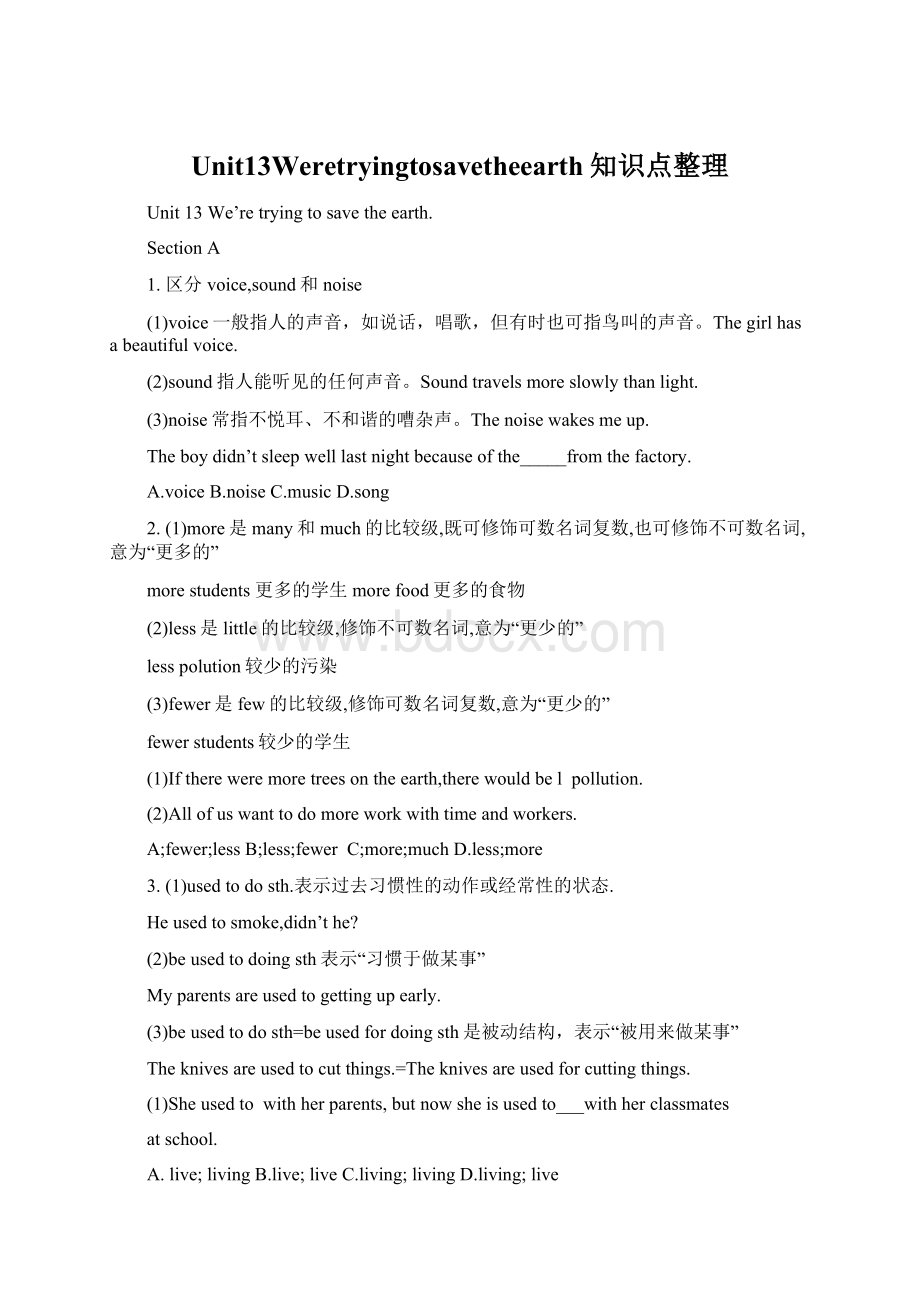Unit13Weretryingtosavetheearth知识点整理.docx
《Unit13Weretryingtosavetheearth知识点整理.docx》由会员分享,可在线阅读,更多相关《Unit13Weretryingtosavetheearth知识点整理.docx(12页珍藏版)》请在冰豆网上搜索。

Unit13Weretryingtosavetheearth知识点整理
Unit13We’retryingtosavetheearth.
SectionA
1.区分voice,sound和noise
(1)voice一般指人的声音,如说话,唱歌,但有时也可指鸟叫的声音。
Thegirlhasabeautifulvoice.
(2)sound指人能听见的任何声音。
Soundtravelsmoreslowlythanlight.
(3)noise常指不悦耳、不和谐的嘈杂声。
Thenoisewakesmeup.
Theboydidn’tsleepwelllastnightbecauseofthe_____fromthefactory.
A.voiceB.noiseC.musicD.song
2.
(1)more是many和much的比较级,既可修饰可数名词复数,也可修饰不可数名词,意为“更多的”
morestudents更多的学生morefood更多的食物
(2)less是little的比较级,修饰不可数名词,意为“更少的”
lesspolution较少的污染
(3)fewer是few的比较级,修饰可数名词复数,意为“更少的”
fewerstudents较少的学生
(1)Ifthereweremoretreesontheearth,therewouldbelpollution.
(2)Allofuswanttodomoreworkwithtimeandworkers.
A;fewer;lessB;less;fewerC;more;muchD.less;more
3.
(1)usedtodosth.表示过去习惯性的动作或经常性的状态.
Heusedtosmoke,didn’the?
(2)beusedtodoingsth表示“习惯于做某事”
Myparentsareusedtogettingupearly.
(3)beusedtodosth=beusedfordoingsth是被动结构,表示“被用来做某事”
Theknivesareusedtocutthings.=Theknivesareusedforcuttingthings.
(1)Sheusedtowithherparents,butnowsheisusedto___withherclassmates
atschool.
A.live;livingB.live;liveC.living;livingD.living;live
(2)Keys______usedfor______thedoors.
A.is,openingB.is,openedC.are,openingD.areopened
4.辨析:
beableto和can
(1)beableto可用于各种时态,表示经过努力而获得的能力.
(2)只有现在式(can)和过去式(could).表示自身已具有的能力或有能力做某事.
(1)Hecouldplaytheguitarwhenhewasfiveyearsold.(改为同义句)
Heplaytheguitarwhenhewasfiveyearsold.
(2)Workhard,andthenyouwill___learnEnglishwell.
A.canB.abletoC.beabletoD.areableto
5.
(1)alone表示“单独的,独自一人的”,不含感情色彩.做形容词时,只能在be动词或系动词之后做表语,做副词时,作状语,修饰动词,相当于byoneself.
Hewasaloneinthehouse.Iwenttothemoviesalone,Ifeltlonely.
(2)lonely表示“孤独的,寂寞的”含有丰富的感情色彩.lonely做形容词时,可做定语和表语。
如:
alonelyvillage孤寂的村庄.
(1)Idon’thaveanyclosefriendshere,Ifeelfromtimetotime.
A.aloneB.happyC.lonelyD.proud
(2)Theoldmanlivesaloneinthesmallvillage.(改为同义句)
Theoldmanlivesinthesmallvillage.
(3)Thoughshelives______,shedoesn’tfeel_______.
A.lonely,lonelyB.alone,aloneC.lonely,aloneD.alone,lonely
6.动词不定式在句中可以作目的状语,既可放在句首,也可放在句末,意为“为了……”
Istayedtheretoseewhatwouldhappen.
TopasstheEnglishexam,IhavetostudyEnglishalldayandallnight.
Hehurriedbackhome____hisschoolbag.
A.fetchedB.tofetchC.fetchingD.fetches
7.cutdown意为“减少;把……砍倒;裁短;缩减”
Tocutdownairpollution,weshouldtakethebusorsubwayinsteadofdriving.
Theycutdownthebigtree.
8.区分insteadof和instead
(1)insteadofdoingsth意为“代替做某事”
(2)instead是副词,意为“代替,相反,而,却”位于句首或句末,后不接
词。
Shedidn’tplaybasketball.Shewentswimminginstead.
Youshouldgoshoppinginsteadofstayingathome.
—Let’sgohikingstayingathome,shallwe?
—Agoodidea.
A.aswellasB.inordertoC.insteadofD.inadditionto
9.
(1)else意为“别的,另外的”,常用在疑问词what,where,why等或不定代词、不定副词something,somewhere,anybody,nothing,someone等后面。
whatelse=whatotherthings别的什么somethingelse一些别的东西
(2)other+名词复数意为“其他的……”
Thereareotheradvantagesofbikeriding.
—Wouldyouliketodrink?
—Yes.I’dlikeacupofcoffee.
A.elsesomethingB.somethingelseC.anythingelseD.elseanything
10.与good相关的常见搭配
(1)begoodat意为“擅长”=dowellinIamgoodatmath.=Idowellinmath.
(2)begoodfor意为“对…有益”反义词组是bebadfor“对……有害处”
Swimmingisgoodforourhealth.
(3)begoodto意为“对…好”=befriendlytosb=bekindtosb
Sheisgoodtous.
(4)begoodwith意为“善于应付……”Areyougoodwithchildren?
MissReadisgood____music.Shecanbegoodwithchildreninthemusicclub.
A.at,B.withC.forD.to
11.
(1)bring意为“带来”,表示从别处把某人或某物带到说话者所在的地方。
常与here连用。
bring…to…意为“把……带到……来”介词to后接人称代词宾格或地点名词。
Don’tforgettobringyourumbrellatome.
Boysandgirls,pleasebringyourpicturestotheclassroomtomorrow.
(2)take意为“带走”,表示把某人或某物从说话者所在的地方带到别处去。
常与there连用.take…to…意为“把……带到……去”介词to后接人称代词宾格或地点名词。
Don’tworry.I’lltakeyouthere.
(1)TheNo.72buswillyouthere.
A.holdB.catchC.takeD.bring
(2)Whenyoucomeherethisafternoon.Please_____yoursister_____you.
A.take,withB.carry,withC.bring,withD.bring,to
(3)Whydon’tyou____yourfriendstotheparty?
Iwanttomeetthem.
A.bringB.bringsC.leavesD.take
12.
(1)remember(forget)todosth“记住(忘记)要做某事”(没做)
(2)remember(forget)doingsth“记得(忘记)曾经做过某事”(做过了)
—Remembertoreturnthebattome.
—ButIrememberreturningittoyou.
Pleaseremember“Excuseme”whenyouaskforhelp..
A.tosayB.sayC.talkD.totalk
13.makeadifference意为“起作用,有影响”
Wewanttomakeadifferencetotheworld.
14.hearofsb/sth意为“听说某人/某事的情况”
hearfromsb意为“收到某人的来信”
Ihaveneverheardofhimsinceheleft.
Haveyouheardofthenews.
—Howoftendoyou_____yourbrother?
—Onceamonth.
A.hearfromB.hearofC.heartoD.hearabout
15.表示方位的名词:
east东,south南,west西,north北
表示方位的形容词:
eastern东部的,southern南部的,western西部的,northern北部的
16.allthecountry=thewholecountry意为“整个国家”
Maryisfishingwithhergrandpa.
A.wholedayB.wholethedayC.thewholedayD.theallday
17.“死”的多种形式:
(1)death名词,意为“死亡,死”Mylittledog’sdeathmademeverysad.
(2)die动词,意为“死亡,死”,非延续性动词,如果和一段时间连用,要用bedead代替。
Hewouldratherdiethanlosethechild.
(3)dead形容词,意为“死的”Hisgrandmotherhasbeendeadfortenyears.
(4)dyingdie的现在分词,常作形容词,意为“临死的,垂死的”Thecatisdying.
OnApril14,2010,aseriousearthquakehappenedinYushu.Morethan2000peopleinit.A.deadB.deathC.diedD.die
18.mustbe一不是;can’tbe不可能是;may/might/couldbe可能是
(1)—Where’sJeff?
—I’mnotsure.
Hebeplayingfootballontheplayground.
A.needB.mightC.mustD.can
(2)Hecomeandseeyounextweek.ButI’mnotsure.
A.mightB.mustC.need
(3)Henrybeathome,becausehephonedmefromBeijingjustnow.
A.mustn’tB.can’tC.must
(4)TheshortgirlbeAlice.Sheisofmediumheight.
A.mustn’tB.can’tC.maynot
(5)—Whosebookisthis?
—It________beLusy’s.Hernameisonit.
A.couldB.can’tC.mustD.might
19.danger是不可名词,“危险”;indanger“处于危险之中”
dangerous形容词“危险的”;endangered形容词,“濒危的;濒临灭绝的”
Isthereanydangeroffire?
It’sdangerousforpeopletoswimintheriver.
Scientiststhinkthattheanimalisendangeredbypollution.
Hislifeisindanger.
20.
(1)join指参加某个组织;加入某个群体,并成为其中的一员。
jointheEnglishclub加入英语俱乐部;jointheParty入党;
joinsb意为“加入到某人当中”joinus加入我们,和我们在一起
(2)takepartin指参加体育运动或比赛。
takeanactivepartinsports.积极参加体育运动
(3)attend指参加会议,婚礼,葬礼,典礼,去上课,上学,听报告等。
He’llattendanimportantmeetingtomorrow.
Iattendedhiswedding.
ThetwinsaretalkingaboutthebookWhoMovedMyCheese.It’sfuntothem.
A.JoinB.joininC.takepartinD.enter
21.afford作动词,意为“负担得起”,常与can,could,beableto等连用,多用于否定句
(1)affordsth意为“能买得起某物”
(2)affordtheprice意为“能负担得起…的价格”
(3)affordtodosth意为“能做某事”
Thecan’taffordanewcar.他们买不起新车。
Wecan’taffordtobuyanewhouse.我们买不起新房子。
Iwanttohaveacomputer,butIcan’ttobuyone.
A.offerB.provideC.considerD.afford
22.takeaction意为“采取行动”
Wemusttakeactionbeforeitistoolate.
23.bydoingsth意为“通过做某事”MrGreenmakesalivingbyteaching.
by+时间,意为“不迟于,在……之前”Ihavetogotobedbyteno’clock.
by+地点,意为“在……旁”Jimsatdownbythewindow.
by+交通工具,意为“乘……”Igotoschoolbybike.
由by构成的固定短语:
bytheway顺便说一下byoneself独自=alone
(1)—HowdoyoulearnEnglishsowell?
—chattingwithmyuncleinAmericaonline.
A.ByB.WithC.InD.And
(2)JacksonstudiedChineseby__________tapes.
A.listeningB.tolistenC.listeningtoD.tolisteningto
(3)Themancalledhisprofessorforhelpbecausehecouldn’tsolvetheproblemby_____.
A.herselfB.himselfC.yourselfD.themselves.
24.turnon打开,turnoff关上,turndown把……调低;关小,turnup把……调大,他们都是动副短语,人称代词必须放在中间.
(1)IcanhardlyhearwhatitissayingonTV.Wouldyouplease?
A.turnitupB.turnitdownC.turnitonD.turnitoff
(2)—Wouldyoumindturningthelight?
It’stoodarkhere.—OK.Waitaminute,please.
A.overB.onC.offD.down
(3)I’mreadingnow.PleasetellhimtheTVabit.
A.turnupB.turnoffC.toturndownD.toturnoff
(4)Please_____thewaterwhenyoubrushyourteeth.
A.takedownB.turnupC.takeawayD.turnoff
25.addup意为“全部加起来”Pleaseaddupthesenumbers.
add…to…意为“把……加到……”Pleaseaddsomesalttothenoodles.
SectionB
1.whendoingsth意为“做某事时”
Whendoingthework,youmustbecareful.
2.throwaway意为“扔掉”
Don’tthrowawaythosevegetables.Wecanfeedthemtothepigs.
3.putsthtogooduse意为“好好利用;充分利用”
He’llbeabletoputhisexperiencetogooduseinthenewjob.
4.putup意为“张贴,搭建”putdown写下,记下
putoffdoingsth推迟做某事puton穿上(反义词组为takeoff)
putaway把……放好putout熄灭
Theyputupanoticeonthewall.Theyputuptheirtentsnearthelake.
We’llputoffholdingthesportsmeetingbecauseofrain.
Thelittleboyputthebowlawayafterhefinishedhisdinner.
Pleaseputdownyournameandaddress.
WhatdressshallIputonfortheparty?
Thefiremensoonputoutthefire.
(1)Nobodycanadvertisementsonthewallwithoutpermission.
A.putonB.putoff C.putupD.putdown
(2)Hi,Jack.Wouldyoupleasethepictureonthewall?
A.pickupB.lookup C.getupD.putup
5.pulldown“拆除;拆毁;放倒”
Alltheoldhousesinthestreethavetobepulleddown.
6.
(1)infrontof意为“在……(外部的)前面”
(2)inthefrontof意为“在……(内部的)前面”
(1)Canyouseearedcarthathouse?
(填infrontof或inthefrontof)
(2)Themanissittingthecar.(填infrontof或inthefrontof)
7.
(1)bemadefrom意为“由……(原料)制成”,表示某物品制成后,已看不
出原材料是什么,原材料在制作过程中已起了化学变化;
Paperismadefromwood.Wineismadefromgrapes.
(2)bemadeof意为“由……(原料)制成”,表示某物品制成后,仍可看得
出原材料,其原料在制作过程中仅起了物理变化。
Thedeskismadeofwood.Theshoesaremadeofcloth.
(3)bemadein+地点意思是“在……(地点)被制造”,介词in后接产地。
ThiskindofcomputerismadeintheUSA.
ThisprintingmachinewasmadeinBeijing.
(4)bemadeby+某人意思是“由……制造”,介词by后跟动作的执行者。
ThismodelshipismadebyUncleWang.
(1)Thiskitepaper.
(2)Paperwood.